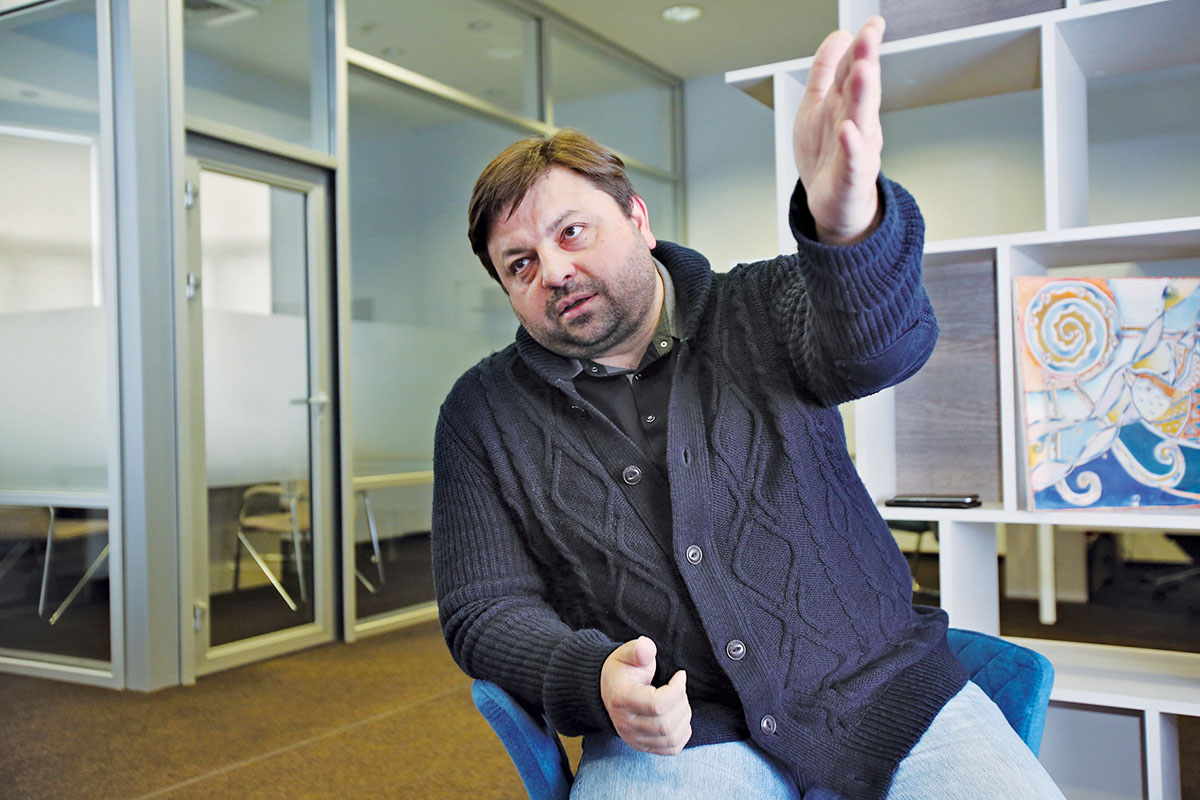Tired of waiting for the government to protect their rights, farmers are starting to take matters into their own hands.
After months of violent raiding attacks on small- and medium-sized farming businesses, the Ukrainian government finally established an Anti-Raiding Commission and has started creating anti-raiding brigades.
But farmers’ and entrepreneurs’ trust in the government and law enforcement agencies is still low, and they have decided to form self-defense squads and civic organizations to fight back against land raiders.
Since January, the Anti-Raiding Union of Entrepreneurs of Ukraine has registered more than 70 cases of the armed seizure of farming enterprises — double the number seen in the same period of 2016. The cabinet’s Anti-Raiding Commission says it has already settled more than 200 land plot disputes.
According to the Economy Ministry, over 3,000 hectares of land has been seized by raiders in 2017. But entrepreneurs and activists claim that the government mechanism is still ineffective, with law enforcers from the Security Service of Ukraine, or SBU, police and Prosecutor General’s Office, as well as local officials failing to protect farmers’ property rights, or worse, colluding in corporate raiding schemes headed by top-officials.
SBU spokesperson Olena Hytlyanska denied accusations that the SBU has been failing to tackle the problem, and said the service has been actively cooperating with businesses. Moreover, law enforcers are putting less pressure on businesses in 2017, she said.
When asked about officials alleged involvement in land seizures, the Prosecutor General’s Office said it refused to comment on rumors.
“To accuse somebody of covering for the raiders, one must have iron-cast evidence of misconduct,” Tetiana Kozachenko, the lawyer of Capital Law Firm and former head of the Lustration Department of Justice Ministry told the Kyiv Post on Dec. 12.
“Law enforcement agencies must provide instruments to find that evidence. In fact, they seldom ignore or help raiders. It’s just that they can’t investigate their own involvement in crimes.” In November, Kozachenko, together with Samopomich Party lawmakers Ivan Miroshnichenko, Pavlo Kostenko and former head of agricultural company Risoil Ukraine Shota Khajishvili, registered a civic organization called Business Varta.

Ivan Miroshnichenko, Samopomich Party lawmaker and business ombudsman of Business Varta, a civil organization that helps businesses to protect their property from raiders, speaks with the Kyiv Post on Dec. 12. (Kostyantyn Chernichkin)
The initiative aims to unite journalists, lawmakers and businesses in jointly opposing violent armed corporate raids, and raiding involving the authorities. Yegor Soboliev, former head of the Rada’s Anti-Corruption Committee, and former deputy prosecutor general David Sakvaleridze have joined Business Varta.
“We only have those lawmakers and officials, anti-corruption activists, volunteer fighters, Donbas war veterans, and journalists who really are fighting against corruption and raiding,” Soboliev told the Kyiv Post on Dec. 15.
“But not people from businesses, as they prefer to watch the situation and make deals.” “But I joined the initiative because I think that only together with businesses we can stand for their property rights. They have the financial recourses, as well as influence and connections,” he said. The main problem is that the raiders can move much faster than owners can mobilize to defend their rights, Miroshnichenko said.
“Raiders can seize a plant or a farm in one day. Just come up with forged documents or armed men and throw the legal owners out, seize not only the business, but money and even the products of an enterprise.”
Legal owners then have to prove they have the rights to the property in the courts, a process that can sometimes take years in Ukraine, he said.
Kozachenko added that in many cases, there was nothing left to fight for after such long-lasting trials: the property and products had either been sold, destroyed or stolen.
“Can an entrepreneur regain property and money seized by raiders in Ukraine? Yes. Can he do it quickly and effectively? Unfortunately no,” Kozachenko said.
How it’s done
Miroshnichenko worked for more than 20 years in the agricultural sector and investment business. He was the head of Cargill’s Ukraine branch and the Black Sea region director of the international corporation Noble Group.
He said corporate raiding had always been a problem in Ukraine. Raiders in Ukraine attack mostly mid-sized businesses worth $7–8 million, whereas larger businesses are protected better, he said.
“In the past raiders would search for a problem in an enterprise’s structure. A potential law violation during the privatization process or during ownership changes,” Miroshnichenko said.
“Now, in 30–40 percent of cases, the raiders just change the ownership by forging signatures, stamps and documents and court decisions, with the help of officials from local governments or the land registers.”
Self-defense
Both Soboliev and Miroshnichenko told the Kyiv Post that despite Business Varta only actually being registered in November, it already started to form this spring, after workers at eight small farms in May protested near the Prosecutor General’s Office and Justice Ministry.
They were completely ignored. A month after the farmers protested in Kyiv, there were violent clashes between activists and police in the village of Berezhynka in Kirovograd Oblast.
Police on June 27 arrested several Donbas war veterans who had come to the village to protect one of its farms from raiding attempts, Ievgen Shevchenko, the owner of the local private security service Security For Business, wrote on Facebook.
Shevchenko said that shortly before the raiders arrived, local farm owners discovered that someone “had passed the ownership rights to an unknown person, who then in a short period of time changed the ownership in the registry and sold the farm to another person.”
But the head of the Kirovograd Oblast Police Serhiy Kondrashenko said on June 27 that neither private security services nor veterans had the right to get involved in such land disputes. He called the actions of the National Guard and police completely lawful.
“I call for all sides in these conflicts not to use violence as a method to resolve land disputes,” Kondrashenko said.
Miroshnichenko said that was not the goal of Business Varta, which he said mostly helps entrepreneurs by providing them legal help and publicizing cases of raids.
“We can’t provide physical protection, but we are now thinking how to provide it in a legal manner,” Miroshnichenko said.
Business Varta still has little in the way of funding, but plans to get financial support from small- and medium-sized businesses. Nevertheless, it has already had some successes.

Olga Matviiva, head of Business Varta, a civil organization that helps businesses to protect their property from raiders, speaks with the Kyiv Post in Kyiv on Dec. 12. (Kostyantyn Chernichkin)
Olga Matviiva, the head of Business Varta, said that more than 20 companies have already applied for Business Varta’s help. “We study every case very carefully before passing it on to the AntiRaiding Commission,” Matviiva said.
That’s because not everyone who claims to have been attacked by raiders is actually the good guy.” She added that every case needs an investigation.
Of the 20 cases that Business Varta’s activists and lawyers have examined, only seven were passed to the government.
“Our main success is that these problems were brought to the attention of the highest authorities and were made public. During the closed meetings of the commission we even meet with senior officials such as (First Deputy Minister) Stepan Kubiv, and other members of the commission,” Matviiva said. “We clearly have Kubiv’s support, and that is already something.”
Government acts
The Anti-Raiding Commission was first created back in 2007, but it was largely non-functioning until Kubiv renewed the commission together with Justice Minister Pavlo Petrenko and other lawmakers in September.
Petrenko wrote on Facebook that during a cabinet meeting on Dec. 6 he had presented a detailed analysis of the most popular raiding schemes in Ukraine and also a new resolution that, according to the minister, would strengthen the protection of rights of owners and tenants from raiding, as well as eliminate the possibility of land plots being illegally seized.
“We made the double registration of land plots impossible. We extended the Justice Ministry’s Mayak SMS service, which informs an owner about any attempts to change the ownership of the property,” Petrenko wrote.
However, the government also said last year that it was doing everything to stop corporate raiding.
In October 2016, the Rada adopted the anti-raiding bill, aimed at stamping out the practice in Ukraine.
The bill made it a crime to tamper with the state registers, and made it a rule that signatures had to be attested by notary. But it didn’t have much positive impact.
Kozachenko said that farmers are now suffering from raider attacks at the highest level since 2014.
“Due to the land moratorium, people are not able to manage their own land, and are forced to give it out for rent at a cheap rate. Local farms are forced to exist in a chaotic market of (paper) rent agreements, which can be easily forged,” Kozachenko said.
